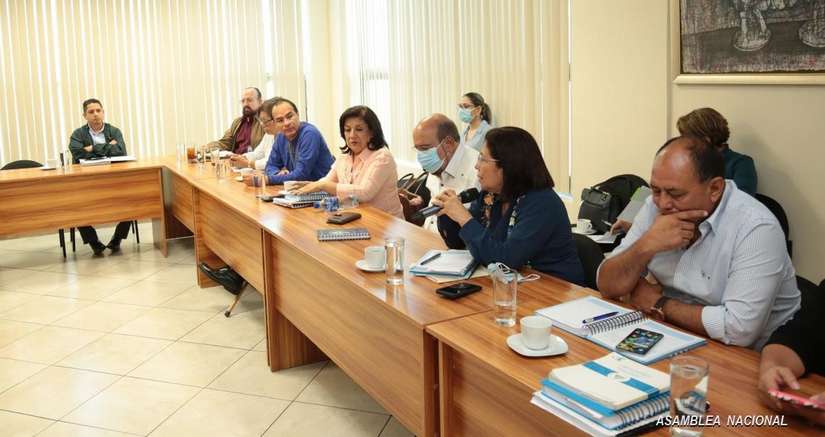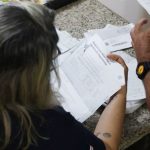A “report” by two commissions of the National Assembly, controlled by Ortega, proposes to increase from 15 to 20 years in prison the sentences against the future political prisoners of Nicaragua tried for “treason against the fatherland”, and promotes the unconstitutional confiscation of their assets through the figure legal “extinction of domain”, in a new attempt to instill more terror among citizens, according to the president of the Nicaraguan Center for Human Rights (Cenidh), Vilma Núñez de Escorcia.
The first recommendation of the report is to add to article 409 of the Penal Code the concept of “extinction of ownership”—a confiscation, according to Núñez—as an accessory penalty “for those convicted who used or acquired property, in the commission of crimes of treason against the homeland, crimes that compromise peace, crimes against the Political Constitution and related, as well as those who benefited from assets delivered by the State.
Núñez criticizes that the wording is confusing, and questions: “Who exactly do you mean by that of those who benefited from assets delivered by the State?” In addition, he alleges that it would be an unconstitutional measure, because the Magna Carta textually prohibits confiscations in its article 44.
The president of the Cenidh also recalls that those convicted in the current repressive context have been mostly for the alleged crimes of “undermining integrity”, and asks if “are they going to start accusing people of treason?”
According to a count of CONFIDENTIAL67 people were detained in 2021 as political prisoners in the most recent wave of persecution to annul electoral competition and impose censorship: 45 were charged with the crime of impairment, and 12 of these were also denounced by fake news. However, a criminal lawyer, consulted on condition of anonymity, warns that there is the possibility of a new wave of arrests using precisely the “crime of treason.”
In the report, the deputies also accept the recommendation to add an increase in the sentence, reforming article 410 of the Penal Code, going from 15 to 20 years, for the crime of “impairment.” The issue would be whether a reform could be applied to the cases already filed against political prisoners, as relatives have expressed to Cenidh.
“It can no longer be applied to current political prisoners because the law does not have a retroactive effect,” says Núñez. The criminal law expert quoted above adds that the proposal was not “sufficiently justified.”
consultations among themselves
On April 27, Ortega legislators sent a report to the Presidency of the National Assembly, supposedly based on “working sessions” with state institutions that make up the criminal justice system and “victims of hate crimes and family members of people killed during the failed coup attempt of 2018”, as the Government refers to the citizen protests that broke out in April of that year and were repressed and massacred by Ortega mobs, police and paramilitaries of the regime.
However, Núñez, a lawyer and former president of the Supreme Court of Justice (CSJ), considers that the proposal does not keep the minimum legal forms and uses confusing and intimidating language, and is in no way a law initiative, despite the fact that the document recommends the formation of an inter-institutional commission to “take action.”
Some of the signatory Sandinista legislators are Edwin Castro, head of the FSLN caucus; Filiberto Rodríguez, Carlos Emilio López and Jenny Martínez, who emphasize that this is a report that addresses the legal criminal regulations that apply “to people who commit cybercrime (fake news), crimes against national integrity, who receive money from outside sources to commit hate crimes,” among others.
For Vilma Núñez, the legislators would be violating the existing norms and procedures. “It is a legal aberration. If they intend to introduce reforms to criminal laws, what they have established does not correspond to what the Constitution and the Organic Law of the Legislative Power say about the process of law formation,” she explained.
The national legal framework indicates that the laws follow a formation process that begins with the presentation of an initiative – the deputies or the president of the Assembly do it before the First Secretariat -, then it is sent to a commission that summons the citizens to consultations and an opinion is prepared that goes to plenary to be discussed and approved in the articles in general, and then in a specific way, and the president of the republic has the option of vetoing the law and then sending it to be published in La Gaceta.
The report contains an “analysis” prepared by the Justice and Legal Affairs Commission and the Peace, Defense, Governance and Human Rights Commission. According to the document, between February 11 and April 6, 25 people were summoned —in 17 sessions— including police officers, judges, prosecutors, appeals magistrates, legislators and alleged victims.
Among those “consulted” stand out Commissioner Lenín Soza Robelo, head of Police Legal Counsel; Javier Morazán, in charge of the Organized Crime Unit of the Public Ministry; Douglas Vargas, Inspector General of the Prosecutor’s Office; Sandinista magistrate Henry Morales and official judge Nadia Camila Tardencilla, among others, all members of the machinery that has made possible the sentences against political prisoners.
Against religious and defenders
The deputies also put under the spotlight two sectors that have been critical of the dictatorship. The “victims consulted” expressed that the penalties should be more severe and demanded justice for “the religious and directors of human rights organizations who were involved in the coup adventure.”
Núñez insists that they use intimidating language towards sectors that were characterized by the defense of human rights when the State brutally repressed opposition demonstrations in 2018. The balance was 355 killed in the context of the protests, according to data from the Inter-American Commission on Human Rights (IACHR). The Executive argued that he was the victim of an attempted coup, of which the international community found no evidence.
Another point of the legislative commissions opens the door to the reform of article 147 of the Criminal Procedure Code and would force the interviewees, during an “investigation” process of the Public Ministry and the Police, to keep reserve, that is to say to remain silent if, for example, they are consulted by the media.
A legislative statement to praise
In the midst of the public controversy that arose, Parliament published this May 4 a statement signed by its first secretary of the Board of Directors of the Assembly, the Sandinista deputy Loria Raquel Dixon, in which she praises the existing legal body regarding crimes of “undermining the integrity and national sovereignty”.
Dixon affirmed that Nicaragua has a “clear and up-to-date legal system that guarantees justice, peace and citizen security,” but they promise that they will continue to guarantee a legal framework that puts the “sacred interests of the homeland” first.
According to the criminal expert consulted, “unfortunately, in a normal consultation process, several sectors would be given the opportunity to present their points of view, however, here they only go. They all met and came to the conclusion that it was the most appropriate proposal, perhaps some small details are that the advisors will change when presenting the project, but they will surely approve it one of these days.















